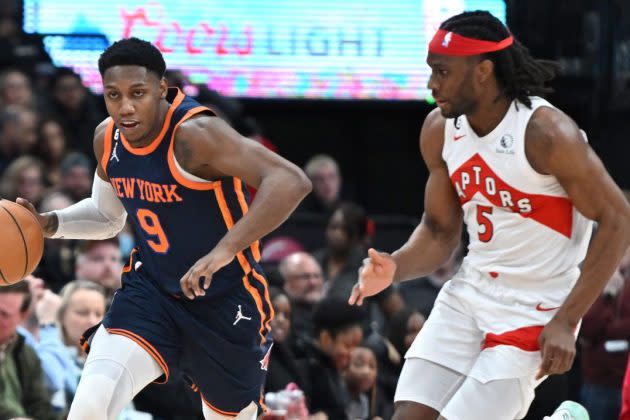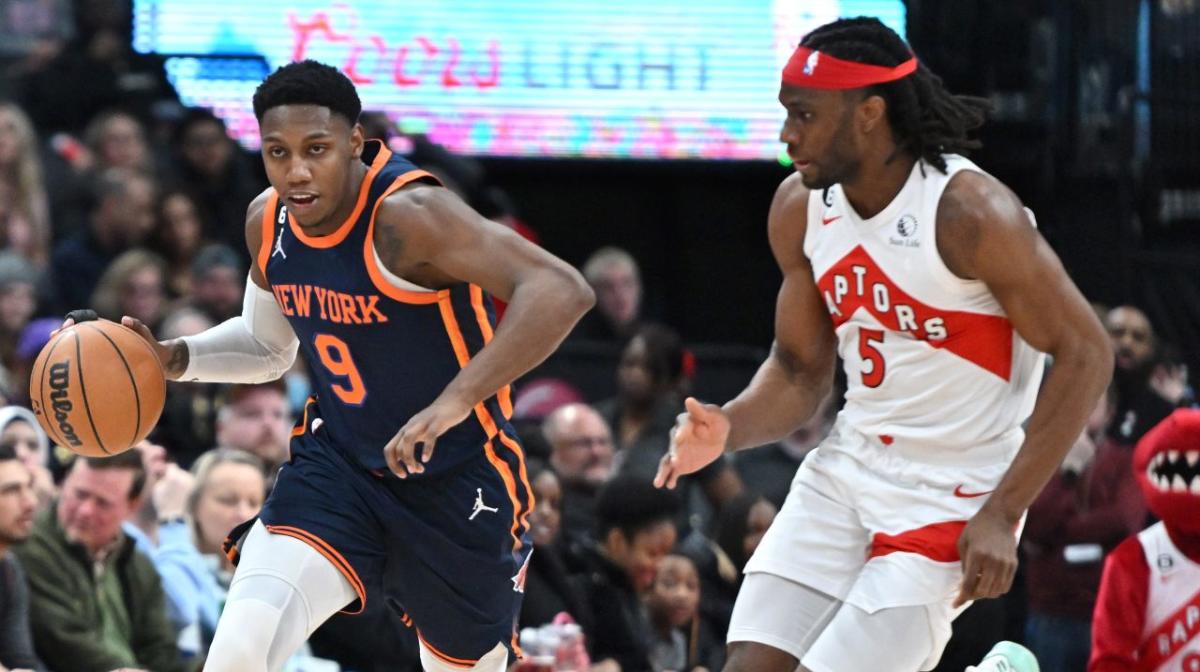
Deriding it as a “baseless lawsuit” and “publicity stunt” and mocking so-called “trade secrets” as mere nuggets of info obtainable via Google searches, the Toronto Raptors on Monday motioned to dismiss the New York Knicks’ lawsuit over alleged “mole” and former Knicks analytics staffer Ikechukwu Azotam.
As Sportico explained in August, the Knicks accuse the Raptors, head coach Darko Rajaković, Azotam and others of misappropriation of trade secrets. The essence of the case, which is before Judge Jessica Clarke of the Southern District of New York, is that Azotam, who left his Knicks job to become the Raptors’ head of video and player development assistant over the summer, allegedly forwarded scouting reports, play frequency reports and analytics materials to his Raptors contacts. The Knicks depict those contacts as recruiting Azotam “to serve as a mole” in a scheme to extract proprietary information.
More from Sportico.com
The Raptors ridicule the cloak-and-dagger depiction of events as overblown, unsubstantiated and—most importantly for legal purposes—unsuitable for judicial review.
The Raptors stress that under the NBA constitution, which is a document governing the legal relationship between teams and the league and which all teams contractually assent to follow, NBA commissioner Adam Silver has “exclusive, full, complete and final jurisdiction of any dispute” involving two or more teams. His decision is also “final, binding and conclusive.” NBA teams therefore accept that Silver, acting as an arbitrator, must first review a dispute before a team can petition a court to vacate the commissioner’s decision.
The Raptors argue the Knicks were well aware their “only path” is through Silver, but opted for a “public process” as a means to “tarnish the stellar reputations” of Rajaković and Azotam and to “chill present and future Knicks’ employees from their pursuit of employment” with other teams. The Raptors say they didn’t even know about the lawsuit until it was reported by the media.
According to the Raptors, NBA general counsel Rick Buchanan has notified both teams the league hasn’t determined whether their dispute “should be adjudicated in federal court or before the commissioner.” As expected, the league will abide by court rulings on that subject.
The Raptors also dispute they did anything wrong. The team argues the so-called trade secrets consisted of team and player statistics, player tendencies and play calls from other teams. This information was compiled from video of NBA games that are accessible to every team and to the general public. The Raptors also say that while the Knicks accuse Azotam of stealing a “play book,” that book “was nothing more than a schedule of the prior 2022-23 NBA season with scout assignments that Mr. Azotam desired to use as a template for the 2023-24 season.”
In addition, the Raptors contend that Azotam using his Knicks login credentials, instead of waiting for his Raptors login credentials, to access game film is a distinction without a difference. Azotam “would undeniably have had access to these exact files using a Raptors’ login.”
The materials Azotam forwarded, the Raptors assert, were “far from confidential” and thus cannot constitute trade secrets. In law, a trade secret must provide a competitive business advantage, must not have been known or shared with the public and the plaintiff (Knicks) must have taken steps to keep the information secret. If, as the Raptors claim, Azotam sent over materials that were accessible to every team, and potentially the general public, those materials would not constitute trade secrets. But expect the Knicks to challenge that portrayal, perhaps by arguing that what made video and statistics proprietary was the way in which Knicks scouts and front office personnel interpreted them and offered impressions.
From a sports law perspective, Knicks v. Raptors is groundbreaking in that teams in the same league simply don’t sue each other. This goes to the heart of league governance: the commissioner is the de facto judge of squabbles involving teams, coaches and others. The commissioner has a level of expertise over league matters that no judge or external arbitrator enjoys and thus is in the best position to make a decision. The commissioner can also ensure that the league’s interests, including that all teams abide by fair play, are maximized in resolving the dispute. Further, the commissioner can mandate the dispute resolution process be kept confidential. Litigation, in contrast, is public and accessible to journalists, who would report on revelations, including those related to team finances, made in sworn testimony or in emails, texts and other evidence.
The Knicks will file an opposition memorandum in the coming weeks. Expect the team to argue that the league constitution does not bestow authority to the commissioner to resolve matters that might implicate criminal law. Six years ago, a scandal involving a St. Louis Cardinals executive hacking the Houston Astros’ email system and scouting database led to criminal charges. Even there, however, MLB investigated under the direction of commissioner Rob Manfred and ultimately docked the Cardinals draft picks and fined them.
While the Raptors and Knicks battle in court, they play their first game in the new season on Dec. 1 in Toronto.
All eyes will be watching.
Click here to read the full article.




